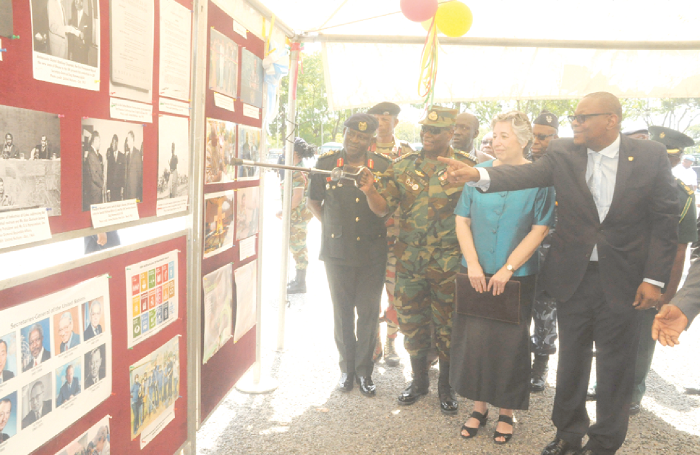A flag-raising ceremony was held in Accra yesterday to mark the 71st United Nations (UN) Day.
This year, the day focused on the Sustainable Development Goals (SDGs) and the celebration was on the theme: “71 years for 17 Goals: Progress, challenges and prospects”.
In Ghana, the occasion was used to highlight the progress made in the past 71 years, the challenges the SDGs seek to address and prospects for the country.
The SDGs, which are a follow-up to the Millennium Development Goals (MDGs), have a set of 17 goals with 169 targets.
Adopted by the UN in September 2015, the SDGs, which officially came into force on January 1, 2016, seek to shape the development agenda of the world for the next 14 years.
The goals cover areas including infrastructure development and industrialisation, addressing inequality within and among countries, promoting gender equality, harnessing clean and renewable energy, combating climate change, preserving the planet, as well as eliminating poverty among people.
Ghana’s commitment
The Deputy Minister of Foreign Affairs and Regional Integration, Mr Emmanuel Bombade, and the UN Resident Coordinator, Ms Christine Evans-Klock, raised the flags of Ghana and the UN, respectively, to mark the day.
Mr Bombade, in a speech, reiterated Ghana’s commitment to ensure that it discharged its international obligations to promote peace and security through participation in peacekeeping operations in the world.
He said the UN had come a long way to represent the aspirations and hope of humanity to work collectively towards peace, prosperity and stability of the world.
He said the UN constituted the most important medium through which the teeming majority of states frequently met over diverse agenda to discuss common issues, build consensus, negotiate common standards and principles of acceptable international behaviour, as well as work individually and collectively to promote the common good of the people of the world.
Challenges
Mr Bombade said while the UN had always grappled with very serious challenges to its global aspirations to promote peace, sustain stability, ensure socio-economic development and safeguard the dignity of the people, “we must celebrate the fact that it has succeeded in promoting multilateralism, not unilateralism, as the best vehicle in tackling global challenges”.
UN Resident Coordinator
Ms Evans-Klock, for her part, called on Ghana to demonstrate again to the world the importance of tolerance for diversity and strong national and regional institutions for resolving conflict and conducting elections in a peaceful and efficient manner.
“There is great expectation and confidence that throughout the upcoming general election Ghana will cement its reputation as a bastion of democracy and peace on the continent,” she said.
She said 25 UN agencies were partnering the government and civil society groups across the UN’s mandate to promote human development, encourage disaster risk reduction, preserve peace and uphold human rights.
The First National Vice-President of the Ghana United Nations Association (GUNA), Mr Kwashie Klu Duvor, on behalf of the students and the youth of Ghana, urged Ghanaians to employ strategies that would involve the youth in all matters relating to implementing the SDGs for benefit the youth of the country.

